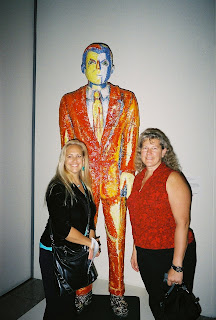The first year I don't get a flu shot in a long time and what happens? I get the flu. It's been a forceful one--four days of a sore throat, more than a week now of weakness and headache, and a relentless wet cough in my aching chest.

I've used the flu as an opportunity to read some of the books on my
bedstand that I've been wanting to read for a while.
I obviously don't need
uplifiting reading when I'm sick if I'm willing to pick up a post-
apocalytpic novel. I read
Cormac McCarthy's
The Road in a day and a half, my skin crawling the entire time. I was let down by the ending (ending a novel is so tricky) but overall, I was electrically unsettled and wholly transported.

Since my mother's struggle with dementia, I've been wanting to read some memoirs about how people live through these experiences.
Death in Slow Motion by Eleanor
Cooney is--with its apt but oddly treacly title--fantastic. If you like a good memoir, this book is worth reading even if Alzheimer's isn't touching your life.
Cooney's mother was an amazing woman whose life story would have been worth telling even without the epically tragic end. Her mother was a unique thinker, a spirit, a fascinating person, and a terrific writer--and Eleanor inherited the writing gene. The book is in no way maudlin. It's honest, clear-eyed, witty, loving, irascible and intelligent. (And this book has a great ending, one I'll never forget.)

Thomas
DeBaggio's Losing My Mind is written by a man with Alzheimer's. It's a fascinating, devastating book. I listened online to a few of his NPR interviews as well. He wants to take the taboo out of the disease. He wants people with the disease to state out loud that they have it and to tell people what it's like. He thinks this will help propel a cure. Amazingly enough, he wrote a second book after this one, which I have on order. I learned that now, however, he no longer reads or writes. He is able to speak a little, and he lives with his wife. Every day she takes him to the family-run nursery where he sees his son and the plants he grew for many years.
 My six-word memoir will appear in the new book, Not Quite What I Was Planning: Six-Word Memoirs by Writers Famous and Obscure that's coming out in February by Harper Perennial.
My six-word memoir will appear in the new book, Not Quite What I Was Planning: Six-Word Memoirs by Writers Famous and Obscure that's coming out in February by Harper Perennial.




 CLA
CLA






